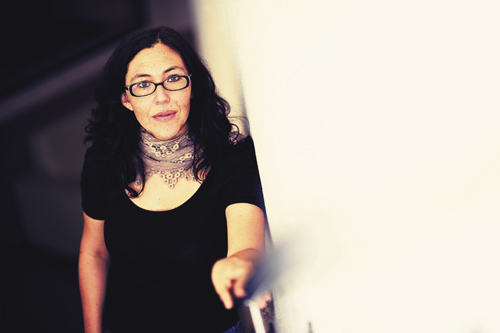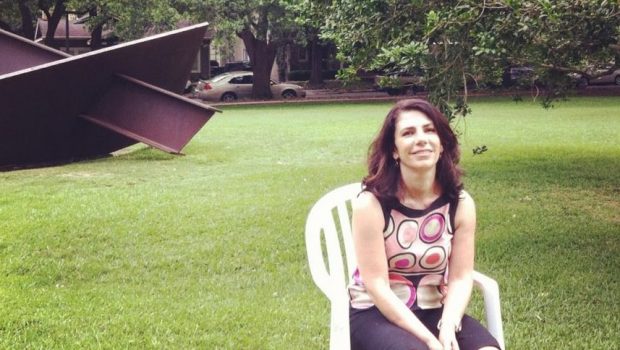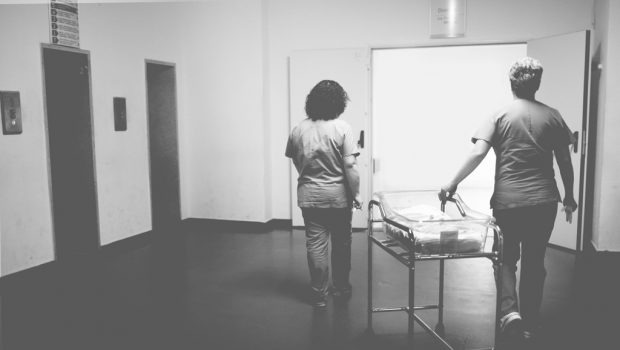A Disorderly Room
Una habitación desordenada
Vivian Abenshushan
Without disorder, a room becomes a prison. That is: a place from which life has been expurgated. Only houses converted into museums (owing in general to the fame of their inhabitants) maintain an immutable order. They are abandoned, but they do not gather dust. They are in view of all, but every object in them remains subject to constant supervision. They are house to pass through, houses to visit, evanescent sojourns. They receive us with mistrust, as strangers. Few will have time to take possession of any one of them, to record the signs of its decay. And fewer still will come to understand the remote origin of a stain on the carpet. However full they may be of ostentatious exterior signs, as in a gallery, without the domestic life that animated them, it is difficult to see in them the clear traces of their owners. It may be that the erudite or enthusiastic visitor will penetrate the human depths of a divan, the mania hidden in the worn upholstery of a chair. But in general there is no task so difficult and so laborious as divesting a thing of the mourning imposed on it by order.
If it should occur to us one day to visit the museumhouse of a writer whom we admire, the first thing we would look for in it is the workroom, where he must have spent most of his time. We are anxious to slip surreptitiously into this setting which we imagine to be industrious and extraordinary: walls lined with books, papers scattered about, coffee cups piling up on the chairs, books lying open one atop another in perpetual procreation. A certain superstition leads us to suppose that the writer remains crouched down somewhere, so we do not want to miss a single detail. On entering the room, however, we are surprised by a lamentably bureaucratic organization. All of the furniture is in its place, without those charming alterations that day-today readjustments tend to establish, free of rank and procedure. Arranged thus, things lose their familiarity, they neither get in the way of, nor gain ground on, one another, they neither mingle nor murmur: they languish in boredom. We may quiver with emotion at the sight of a quill next to its inkwell, but whatever significance we wish to foist on the discovery, even Goethe’s pen, if it is not in use, is reduced to conformity with any other object, and loses its meaning. We were looking for the five worktables with which Stevenson furnished his ideal house, but we found only a desert island, with at most a few engravings by Piranesi and some Polynesian objects that had been carefully dusted, leaving them dry, bloodless, and inhuman. The room positively gleamed, and if in an odd corner some sign of negligence had crept in, it seemed a premeditated anomaly. In such a place—we thought—one could only work in prison garb or fetters.
It is natural in such circumstances to reject dissatisfaction, since it is already a privilege to penetrate into the nooks and crannies of a life with which we feel great affinities, but from which we consider ourselves materially distant. The strict rules of the museum, however, forbid us to touch the objects and so strip them of their stubbornly static limits. We are forced therefore to remain on this side of the barrier, just as the unaltered geometry of an English garden invites us rather to contemplate it than to stroll through it. After a while we come to understand with resignation that the disproportion between what we were expecting to find and the setting imposed on us resides in something simply irremediable: the absence of the writer. In order to find him, we would have to animate the tour of his empty house with the reading of his diaries and notebooks. In those pages, the workroom traces an outline of itself, unstable and fragmentary, without polish or visible proportions, but rather full of conjectures, ephemeral enthusiasms, rough drafts, groans of discouragement, self-rebuke, excesses.
Inside a room, life is as inconstant and unpredictable as one’s moods; so no museum curator, however meticulous and faithful, will be able to preserve the intimacy of an abandoned room, as Stevenson himself would have done simply by coughing into a dirty handkerchief.
It is a fact: we inhabit things and things inhabit us. We do not acquire them only in accordance with our needs, but also with our whims, our tastes, our most secret longings. They are points of reference, the pigeonholes of our personality. At times they point to an alliance with another person, and when that alliance is dissolved, we put them away in a drawer or return them to their owners. At other times they synthesize the details of a journey or a sorrow. Things, therefore, form the texture of our existence and are covered with our dust. But they are not only the agents of our past. There are things that place us under an obligation, such as the empty notebooks in which we are to write something, even if it be nonsense. The fact is that we maintain a relationship with them which will only end when they are lost forever, because we throw them away or we die. And the relationship between things and human beings is—like any other—sinuous and imperfect.
The main problem is the place they occupy or are to occupy. That place is always uncertain, because things come to life as soon as we touch them. They change place, they pile up, they congregate, they conspire. The pen falls from the table and lies on the floor. But it only seems to be at rest. Tomorrow we shall find it together with other pens in our bedclothes. And it is not that things spring up from nothing, but rather that they are subject to the fluctuation of our inattention and our enthusiasms, they move at the unpredictable rhythm of our actions: their disarray emanates from ourselves.
One of the basic rules of a good host demands that the house be put in order before the guests arrive. This might seem forced and hypocritical were it not derived from a more legitimate rationale: the right to privacy. In their proper place, objects are restrained and impervious; disorder, on the other hand, denudes them. An overflowing ashtray, a tangled sweater, a telephone number forgotten on an armchair may well reveal more of some intimate unrest that the psychoanalyst’s couch. To put things where they belong, therefore, is a way of hiding them. But there is always something that escapes the circumspection of the owner and gives the game away. “So you’re reading Malatesta, you who claim to be a reactionary!” exclaims someone with malice on finding a book on the floor. These slips, these breaches of discretion, are inevitable, because in a place where someone really lives it is impossible to annihilate disorder. That is something I came to understood a long time ago, which is why I no longer put up any resistance.
But why pretend? In my case, disorder always ensues, it results, it supervenes; I would even dare to say: it is. But it is never a case of a violent or arbitrary breaking in. It happens rather by gradual and cyclical accumulation: it begins by enlisting some scattered papers, then it persuades two or three books, later on it spreads to the region of coffee cups, and so, slowly but inexorably, it establishes its empire, upwards, downwards, on all sides, giving shape to a landscape so varied and prolific that I can hardly give expression to it by memory: in my bedroom, the bed unmade, books strewn on the little bench I use as a bedside table, bottles of water (usually empty), a pack of cigarettes (also empty), mysterious letters that I am in the habit of rereading before going to bed, pants hanging over the backs of chairs, a rough copy of my tax return, painkillers, an exotic plant, a copy of Cocteau’s Opium, stones from a riverbed, a literary journal from 1991, some unfinished notes, a well-thumbed dictionary; in my study, whose panorama is almost the same, ashtrays full of cigarette butts, messages on little pieces of paper, old newspapers, two bookcases (insufficient), unopened envelopes, worthless undated drawings scattered about, a few teacups and, of course, my desk which is a sort of disorder among the disorder, that is, an uncountable universe. (For admirers of the detailed inventory, I recommend the one drawn up by Perec of the things on his worktable, in Penser/Classer, 1985).
At times the sense of suffocation forces me to trace each object back to its source, a task which takes up a lot of time and which in any case I consider useless, because the disorder is perpetually renewed, like the serpent’s tail. I know from the start that in my own house I will never feel the vanity of being in command, because every book that has left its place gains its independence forever: how could I put it back among the titles which have arrived in its absence without provoking a general uprising on the bookshelf. The disorder keeps me with my hands tied: its most skillful manoeuvre is blackmail: it knows that stemming it would be like interrupting the course of my own existence. So we have come to an agreement based on mutual acceptance; otherwise, if I were to determined to subdue it completely, I would have to set fire to my books and belongings or remain motionless; and if I were to subject myself to its absolute dominion, I would be obliged to return to a nomadic existence, fleeing constantly from one pigsty to another.
The only person in the world who has understood this complex communion of interests is called Juana, and she is therefore the only person I allow to put order in my disorder. They say that Tolstoy was forever cursing his wife, especially when, moved by pity and love, she would get it into her head to create a clearing in the jungle of his desktop. Juana would doubtless have placated Tolstoy’s anger by disarming him. She might be likened to a breeze that lightens the jungle without deforesting it. She neither inspects, nor invades, nor corrupts; she cleans so that the disorder can continue on its way, freed it of its radicalism and unintelligibility. Though she is impeccable, though no corner escapes her diligence, we have almost never had a misunderstanding, because her dust cloth does not deform the natural clutter of my writing desk, but rather renders it more itself. For this reason, and for others such as affection and certain stories which have no place here, ever since I met her (some fifteen years ago now) I have felt an immense fondness for her. At times I have had the impression that, without her weekly presence, the anarchic equilibrium of my life would tumble irremediably into chaos.
Juana knows exactly how to clean the apartment: by leaving it in disorder. And this originality, that is, this grave infraction of the orthodoxy of pulchritude, is as disconcerting as it is efficient. She does not proceed methodically or, rather, her method consists of taking things from their usual place and abandoning them to their fate for a little while. Instead of starting with the kitchen, continuing with the bedroom, and finishing with the bathroom; or if you will, starting by washing the dishes, and then proceeding to the sweeping, the dusting, and the mopping up, Juana jumps from place to place in the apartment leaving a trail of sweepings and stacked-up furniture, and not in the corners of the rooms, but in the middle, or all over. After a while, the place looks like a disaster area or a minefield where it is impossible to move without stumbling over something. Juana, however, removes the debris jumping nimbly from one side to another, as if she knew the geography of her disorder by heart. The only problem is that we cannot be there together; her working days are generally my days of leisure or banishment, for although she always returns things to their accustomed instability, her disorder gets in the way of mine.
This exclusivity of disorder has led me to conclude that filth is a form of territorial appropriation. And this is a principle that can easily be observed in nature. Antelopes, for example, erect an impenetrable barrier around themselves with their own urine. Thus, when they migrate from one place to another, the first thing the leader of the herd does is to urinate all around in order to keep the females far from the courtship of other males, who will have to fight to the death if they succeed in passing through the pestilence. The same thing happens with lions and, albeit in different circumstances, with human beings. When we go camping, for example, the first thing it occurs to us to do is to clear a space, making a place for ourselves in that alien dwelling of forest or beach, which has also scattered about its debris, its rocks and branches, as proof of its dominion. What is strange is that the interior of our tent can be a mess, so long as it contains not the trace of a dried leaf. As if segregation were a kind of imperial distinction, we take refuge in our own chaos in order to draw a line –an illusory one perhaps– between the inclemency of the exterior and our own, which seems less uncertain to us.
Without disorder, therefore, a room is but an empty city, still unconquered. Which is why, when I occupy a hotel room, I have to empty my suitcase onto the chairs and stools until the—generally inhospitable— place acquires some of the characteristics of my own bedroom. A few months ago, however, in my room in a little hotel in the center of Oaxaca, I happened to find a pair of green underpants lying on the floor and a tube of toothpaste on the bed. More than just uncomfortable, I felt expelled, as if the previous guest had not entirely gone. It was no help that the chambermaid immediately took away the articles; that night I dreamed that the owner of the green underpants returned to the room, carelessly undressed, tossing his clothes in all directions, and then turned down the sheets as he usually did on the left side of the bed where I was sleeping. The next day I asked to change rooms because “I needed—I said with emphasis to the front desk clerk— to be alone”. It is true that there was no one else registered in the room, but those little vestiges of an alien disorder had almost completely inhibited my own. By twelve o’clock noon, my things and the hotel’s had still not come to grips, had not coalesced or intermingled, and this indifference preventing me from getting into tune with myself. When I finally managed to be moved to another room, I had an attack of dermatitis and had to return home.
This anecdote, which happens to be true, has led to the following consideration: disorder is the watchdog of solitude. This is why it is so often to be found at the heart of marital quarrels. “Stay out!” the jumbled drawers of the husband seem to say, as if they constituted the last bastion of the isolation which he would seem to have renounced in the marriage contract. If we admit that disorder is an emanation of the ego, a natural result of our development in the world, then the common complaint “I’m sick and tired of your mess!” takes on new meaning: “If there is no place for my own disorder among your debris, I’m leaving…”, for example. In any case, the joint management of disorder is always a problem, for the more strictly one spouse undertakes to maintain order, the more the other persists in undermining it. Thus, the two members of the marriage or relationship take turns through the course of their unhappy existence.
Two solutions occur to me. The first consists of tearing down the barrier between the spouses’ respective disorders and making one of them: of fusing stocking and tie into an undifferentiated whole, a fine homogenous knot, harmonious and uniform. This solution is dangerous and not to be recommended because it implies completely giving up one’s individuality. The second is more just, but also more difficult to put into practice, at least in the precarious economic circumstances in which most of us live. It does not require giving up one’s disorder, but simply restricting it to a place apart, to another room at least, in which each person can be alone and enjoy the insolence and confusion of his or her soul: a room of one’s own.
That last phrase would seem to invite variations on Virginia Woolf’s well-known essay, according to which the act of writing is equivalent to making a place in a house. I often wonder in this connection whether it is possible for two writers to live in the same place. An amusing photo (which I keep on my desk) of Henry Miller and Lawrence Durrell in bed together assures me that at least they can sleep together without their dreams interfering. But the question is how two writers can share a house, because no activity is so solitary, and consequently so demanding of the singularity of disorder, as writing. We know that Flaubert retired to the countryside to write, and of his relationship with Louise Colet there survive only long-distance billetsdoux. Silvina Ocampo and Bioy Casares certainly never had problems, because their economic solvency allowed them to have not only private rooms, but even estates, haciendas, and footpaths broad enough to write without ever getting in each other’s way. But I will leave the exploration of this subject in the hands of those with more time and experience.
I would like to add just one thing: nothing is so similar to my disorderly room as the page on which I write. Whole zones of groping, excesses, thinking and rethinking, abundant and nonsensical, are abandoned to their fate to be swallowed up and transfigured until the day of cleansing when I strip the bed—the blank page—of its bedclothes, stretch out on it, and give order and proportion to my ideas. I know it is not a good method, but it is the only one that suits me.
Sin desorden, cualquier habitación se convierte en un presidio. Es decir: en un lugar donde la vida ha sido expurgada. Sólo las casas convertidas en museos (generalmente por la celebridad de sus habitantes) guardan un orden inmutable. Están abandonadas, pero no acumulan polvo. Están a la vista de todos, pero ahí cada cosa permanece sometida a una vigilancia constante. Son casas de paso, de paseo, estancias evanescentes. Nos reciben con desconfianza, como a unos desconocidos. Pocos tendrán tiempo para entrar en posesión de alguna de ellas, para registrar las señas de su deterioro. Muchos menos serán los que entiendan el origen lejano de una mancha en la alfombra. Y aunque estén pobladas de signos exteriores y ostentosos como en una galería, sin la vida doméstica que los animaba, es difícil ver en ellos los rasgos patentes de sus dueños. Es probable que el visitante erudito o apasionado descubra el trasfondo humano de un diván, la manía oculta en el desgaste de una silla. Pero, en general, no hay tarea más difícil y penosa que desvestir el luto que todo orden impone.
Si un día nos ocurre visitar la casa-museo de un escritor al que admiramos, lo primero que buscamos en ella es el cuarto de trabajo, donde debió pasar la mayor parte de su tiempo. Ansiamos deslizarnos clandestinamente en esa escenografía que imaginamos laboriosa y descomunal: paredes atestadas de libreros, papeles desperdigados, tazas acumulándose sobre las sillas, libros entreabiertos unos encima de otros en procreación perpetua. Cierta superstición nos hace suponer que el escritor permanece agazapado en algún lado y, por eso, no queremos perdernos detalle. Sin embargo, al entrar en la habitación nos sorprende una lamentable distribución burocrática. Todo el mobiliario se encuentra en la forma y en el lugar debidos, sin esas bellas alteraciones que el desplazamiento cotidiano va organizando por aquí y por allá, prescindiendo de trámites y jerarquías. Así acomodadas, las cosas pierden su familiaridad, no se estorban ni avanzan unas contra otras, no se inmiscuyen ni murmuran; languidecen de hastío. Nos estremecemos ante el hallazgo de una pluma cerca del tintero, pero, por más significaciones que queramos endilgarle, si está fuera de uso, la pluma de Goethe queda reducida a la conformidad de un objeto cualquiera, recae en la insignificancia. Buscábamos las cinco mesas de trabajo que Stevenson había previsto para su casa ideal, pero encontramos sólo un islote desierto, si acaso con algunos grabados de Piranesi y objetos polinesios cuidadosamente desempolvados, es decir, desecados e inhumanos, sin pulso. La habitación relumbra y si en algún rincón se insinúa un descuido, esa anomalía parece premeditada. En un lugar así —pensamos—, sólo se podría trabajar con uniforme o grillete.
Es natural que en circunstancias como ésa nadie acepte la insatisfacción, porque ya es bastante privilegio el hecho de internarnos en los recovecos de una vida con la que guardábamos enormes afinidades, pero de la que nos considerábamos materialmente distantes. Las reglas estrictas del museo, sin embargo, nos impiden tocar los objetos y despojarlos de sus límites tercamente estáticos, y así, nos sitúa siempre en este lado de la frontera, como extranjeros o intrusos, del mismo modo que la geometría inalterada de los jardines franceses invita más a la admiración pasiva que al paseo. Después de un rato llegamos a comprender que la desproporción entre lo que esperábamos descubrir y el escenario que se nos impone radica en algo simplemente irremediable: la ausencia del escritor. Para encontrarlo, habría que animar el recorrido por la casa vacía con la lectura de sus diarios y cuadernos de apuntes. En esas páginas, el cuarto de trabajo se va dibujando a sí mismo, inestable y fragmentario, sin proporciones ni pulimentos ostensibles, más bien lleno de conjeturas, entusiasmos efímeros, gemidos de desaliento, excesos.
Al interior de una habitación, la vida es tan inconstante e imprevista como los estados de ánimo; por eso, ningún museógrafo, por más acucioso y fiel que sea, podrá preservar la intimidad de un cuarto abandonado, como lo haría el propio Stevenson al toser sobre un puñado de servilletas sucias.
Es un hecho: habitamos las cosas y las cosas nos habitan. No las adquirimos sólo por necesidad, sino también por capricho, por gusto, por pulsiones más secretas. Son puntos de referencia, gavetas de nuestra personalidad. A veces su procedencia señala una alianza con otra persona; por eso, cuando esa alianza se rompe, las guardamos en cajas o las regresamos a sus dueños. Otras, sintetizan los pormenores de un viaje o una desventura. Las cosas están en la trama de nuestra existencia y se recubren con nuestro polvo. Pero no son sólo agentes de un pasado remoto y clausurado. Hay cosas que nos comprometen, como los cuadernos en blanco en los que habremos de escribir algo, aunque sea insensato. El caso es que mantenemos con ellas una relación que sólo termina cuando se extravían para siempre, cuando las desechamos o morimos. Y como toda relación, la que se establece entre los hombres y las cosas también es imperfecta, sinuosa.
El mayor problema es el lugar que ocupan o habrán de ocupar. Ese lugar siempre es precario, porque las cosas se animan en cuanto las tocamos. Cambian de sitio, se congregan, se hacinan, les encanta la sedición. La pluma se cae de la mesa y se queda en el suelo. Pero sólo en apariencia está quieta. Mañana la encontraremos reunida con otras plumas entre nuestras cobijas. Y no es que las cosas broten de la nada; más bien, su desacomodo emana de nosotros mismos.
Una regla elemental del buen anfitrión exige arreglar la casa antes de que lleguen las visitas. Eso podría tener algo de forzado e hipócrita, si no entrañara una razón más legítima: la de resguardar la vida privada. Si están intactos, los objetos se muestran refractarios, parcos. En cambio, el desorden desnuda. Un cenicero pululante, un suéter enredado, un número telefónico olvidado en un sillón, pueden revelar más sobre un desasosiego íntimo que un diván de psicoanalista. Poner las cosas en su sitio es, entonces, una forma de esconderse. Sin embargo, siempre hay algo que escapa a la previsión del propietario y lo pone al descubierto. “¡Así que estás leyendo a Malatesta, tú que te decías un reaccionario!”, exclama alguien con insidia al descubrir un libro en el suelo. Esos deslices, esas ranuras indiscretas, son inevitables, porque en un lugar donde se habita realmente no es posible aniquilar el desorden. Eso es algo que yo he comprendido hace tiempo y, por lo tanto, no opongo ninguna resistencia.
Para qué disimularlo; en mi caso, el desorden siempre sobreviene, ocurre, acaece; me atrevería a decir incluso que es. Pero no se trata en ningún caso de una irrupción violenta o arbitraria. Su procedimiento es más bien la acumulación gradual y cíclica: comienza por recaudar hojas dispersas, luego persuade a dos o tres libros, más tarde se expande hasta la provincia de las tazas, y así, lenta pero inexorablemente, va edifi- cando su imperio, hacia arriba, hacia abajo, hacia los bordes, hasta configurar un paisaje tan pródigo y abigarrado que apenas puedo enunciarlo de memoria: en mi dormitorio, la cama revuelta, libros desparramados sobre el banquito que hace las veces de buró, botellas de agua (generalmente vacías), un paquete de cigarros (también vacío), cartas de otra época que suelo releer antes de acostarme, pantalones colgando de las sillas, la declaración de impuestos (en borrador), pastillas para el dolor de cabeza, una pata de elefante, el Opium de Cocteau, piedras de río, alguna revista literaria del 91, notas a medio terminar, un diccionario deshojado; en el estudio, cuyo panorama es casi el mismo, los ceniceros repletos de colillas, papelitos con recordatorios, periódicos viejos, dos libreros (insufi cientes), sobres sin abrir, dibujos malos, dispersos y sin fecha, varias tazas de té y, por supuesto, el escritorio que es como un desorden en medio del desorden, es decir, un universo innumerable. (Para los aficionados al inventario minucioso, recomiendo el que hizo Perec sobre los objetos de su mesa de trabajo, incluido en Penser/Classer, Hachette, 1985).
A veces el sofoco me obliga a rastrear el lugar de origen de cada cosa, tarea que me quita mucho tiempo y que, por lo demás, considero inútil, porque el desorden se renueva a perpetuidad, como la cola de la lagartija. Sé de antemano que en mi propia casa nunca sentiré la vanidad del mando, pues todo libro que ha salido de su sitio gana para siempre su autonomía: ¿cómo ingresarlo en medio de los títulos que llegaron en su ausencia sin armar una revuelta general en el librero? El desorden me tiene atada de manos; su maniobra más acabada es el chantaje: sabe que refrenarlo sería tanto como interrumpir el curso de mi propia existencia. Así que hemos terminado por establecer un acuerdo basado en la común aceptación; de otra forma, si me empeñara en aplacarlo por completo, tendría que prenderle fuego a mis libros y pertenencias o quedarme inmóvil; y si me sometiera a su colonización absoluta, me vería obligada a huir constantemente de una pocilga a otra, regresar al nomadismo.
La única persona en el mundo que ha comprendido esa compleja comunión de intereses se llama Juana y ella es, por lo tanto, la única a quien permito poner orden en mi desorden. Dicen que Tolstoi maldecía a su mujer a cada rato, pero sobre todo cuando, llevada por la piedad y el amor, se le ocurría despejar el bosque caótico de su escritorio. Pues bien, Juana habría acallado la cólera de Tolstoi dejándolo desarmado. Digamos que lo suyo es escurrirse como un viento que aligera el bosque sin deforestarlo. No fiscaliza, ni invade, ni corrompe; limpia para que el desorden siga su camino, quitándole de encima toda ofuscación, todo radicalismo. Aunque es impecable, aunque no hay rincón que escape a su prolijidad, casi nunca hemos tenido un malentendido, porque su franela no deforma el desparramamiento natural de mi escritorio; lo vuelve más él mismo. Por eso, y por otras razones como el afecto y algunas historias que no viene al caso referir aquí, desde que la conozco (hará unos quince años) siento un apego desmedido hacia ella. A veces he tenido la impresión de que sin su presencia semanal, el equilibrio anárquico de mi vida caería en un caos irremediable.
Juana conoce la forma exacta de limpiar el departamento: desordenándolo. Y esa originalidad, es decir, esa grave infracción a la ortodoxia de la pulcritud, es de una naturaleza tan desconcertante como eficaz. No procede metódicamente o, mejor, su método consiste en sacar las cosas de su lugar común y abandonarlas durante un rato a su suerte. En vez de empezar por la cocina, continuar con la recámara y concluir en el baño; o si se quiere, comenzar por lavar los trastes y proseguir con el barrido, la sacudida, el trapeado, Juana recorre a saltos el departamento y va dejando a su paso dunas de polvo y muebles amontonados, no en las esquinas, por cierto, sino en el centro, incluso en todas partes. Después de un rato, el lugar parece una zona de desastre o un campo minado y es imposible estar ahí sin tropezar a cada instante. Sin embargo, Juana remueve los escombros saltando con agilidad de un lado a otro, como si conociera la geografía de su desorden de memoria. El único problema es que no podemos estar juntas; en general, sus días de trabajo son para mí días de asueto y exilio, pues, aunque siempre devuelve las cosas a su inestabilidad habitual, mientras está en acción, su desorden y el mío se estorban.
Tal exclusividad del desorden me ha llevado a pensar que la inmundicia es una forma de apropiación territorial. Y éste es un principio que se puede observar fácilmente en la naturaleza. Entre los antílopes, por ejemplo, la fetidez de los orines funciona como un cerco inexpugnable. Así, cuando emigran de un lado a otro, lo primero que hace el jefe de la manada es orinarse en los alrededores, para mantener a las hembras lejos del cortejo de otros machos que tendrán que batirse a muerte si logran franquear la pestilencia. Lo mismo ocurre con los leones y también, aunque en circunstancias distintas, con los humanos. Cuando acampamos, por ejemplo, lo primero que procuramos es despejar el solar, hacernos un lugar en esa casa ajena que es el bosque o la playa, y que también ha diseminado sus escombros, sus rocas y ramas, como manifestación de su dominio. Lo extraño es que el interior de nuestra casa de campaña puede ser un desastre, pero no debe permanecer en ella ni la sombra de una hoja seca. Como si la disgregación fuera una especie de distintivo imperial, nos amparamos en el caos propio para marcar un límite (ilusorio) entre las inclemencias del exterior y las nuestras, que nos parecen menos inciertas.
Sin desorden, cualquier habitación no es más que una ciudad vacía, aún no conquistada. Por eso, cuando llego a un cuarto de hotel necesito vaciar el interior de mi maleta sobre los taburetes y sillas, hasta que el conjunto, generalmente inhóspito, adquiere atribuciones parecidas a las de mi propia recámara. Sin embargo, hace algunos meses me sucedió que, después de haberme instalado en un pequeño hotel en el centro de Oaxaca, descubrí en el suelo de mi habitación una trusa verde y sobre la cama, una pasta dental. Más que incómoda, me sentí expulsada, como si el huésped anterior no se hubiera ido del todo. De nada sirvió que la señorita del servicio removiera los objetos y se los llevara consigo de inmediato; esa noche soñé que el dueño de la trusa verde regresaba al cuarto, se desvestía sin cuidado arrojando su ropa en todas direcciones, y luego, mientras yo dormía ahí mismo, destendía la cama para acostarse, como era su costumbre, en el lado izquierdo. Al día siguiente, pedí que me cambiaran de habitación, porque “necesitaba —con ese énfasis se lo dije al recepcionista— estar a solas”. Era un hecho que no había ningún otro huésped registrado en la habitación, pero esas pequeñas salpicaduras de un desorden ajeno habían inhibido, casi por completo, el mío. Hacia las doce del día, mis cosas y las del hotel no se habían acometido aún, no se habían confundido ni revuelto, y esa indiferencia me impedía entrar en sintonía conmigo misma. Cuando finalmente logré trasladarme de una habitación a otra, se terminó el viaje y tuve que regresar a mi casa.
El desorden es el perro guardián de la soledad. De ahí que con tanta frecuencia se encuentre en el centro de las discusiones conyugales. “Prohibido entrar aquí”, parecen decir los cajones revueltos del marido, como si en ellos se cifrara el último reducto de aislamiento al que pareció renunciar en el contrato de matrimonio. Si aceptamos que el desorden es una emanación del yo, una consecuencia natural de nuestro despliegue en el mundo, la exclamación común: “¡Estoy harta de tu desorden!” se reviste de significaciones nuevas: “Si entre tus escombros no dejas espacio para mi propio desorden, me largo…”, por ejemplo. En cualquier caso, la administración conjunta del desorden siempre es un problema, pues entre más se aplica uno en la preservación policíaca del orden, más se ensaña el otro en desquiciarlo. Y así, los miembros del matrimonio o amasiato van tomando turno a lo largo de su infeliz existencia.
Al asunto se le podrían dar, por lo pronto, dos soluciones. La primera consiste en quebrar la barrera entre el desorden de uno y otro de los cónyuges, reuniéndolos en uno solo; hacer de la media y la corbata un conglomerado indiscernible, un bello nudo homogéneo, solidario, sin disparidades. La solución es peligrosa y poco deseable porque equivale a renunciar por completo a la individualidad. La segunda es más justa, aunque también más difícil llevarla a cabo, al menos en las condiciones de precariedad económica que padecemos casi todos. Se trata no de renunciar al desorden, sino de reservarlo para un lugar apartado, cuando menos para otra habitación, en la que cada quien pueda estar a solas y a gusto con la insolencia y confusión de su alma; una habitación propia.
Me parece que lo anterior abre variaciones interesantes sobre el muy conocido ensayo de Virginia Woolf, según el cual, escribir es hacerse un lugar en la casa. Al respecto me asalta a menudo una pregunta y es la de si dos escritores pueden vivir en el mismo sitio. Una divertida foto (que conservo en mi escritorio) en la que aparecen Henry Miller y Lawrence Durrell en la misma cama, me advierte que al menos pueden dormir juntos sin que sus sueños se interfieran. Pero el asunto es cómo ha de compartir la casa una pareja de escritores, porque es un hecho que no hay actividad más solitaria y, por eso, una que exija tanto la singularidad del desorden, como la escritura. Sabemos que Flaubert se iba al campo para escribir y, además, de su relación con Louise Colet sólo se conservan cartas de besos a distancia. Silvina Ocampo y Bioy Casares seguramente nunca tuvieron problemas ya que la solvencia económica les permitía tener no sólo habitaciones exclusivas, sino haciendas, parajes y veredas lo suficientemente anchos para escribir sin estorbarse. En todo caso, dejo la exploración del tema en manos de quienes tengan más tiempo y experiencia.
Sólo me gustaría agregar una cosa: nada guarda una semejanza más plena con mi habitación desordenada que la página en la que escribo. Zonas íntegras de tanteos y desmesuras se van anegando en ella, se transfiguran abandonadas a su suerte, hasta que llega el día de la depuración en el que dejo la cama despejada, la página en blanco, y me tiendo en ella para darle algún orden y proporción a mis ideas. No sé si es un buen método, pero es el que me acomoda.










